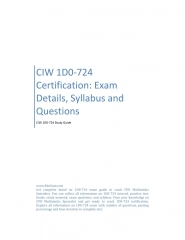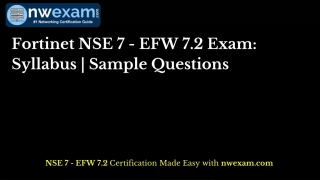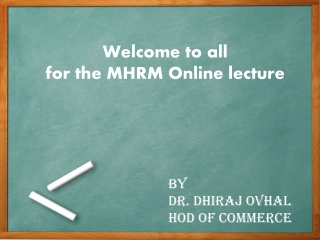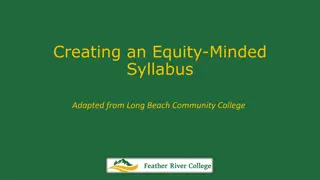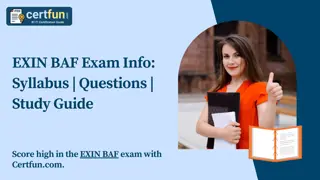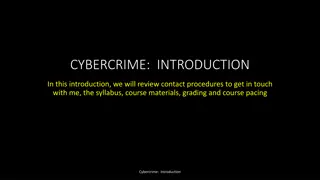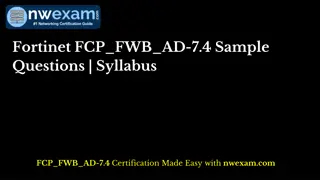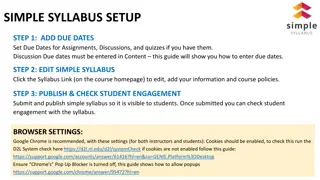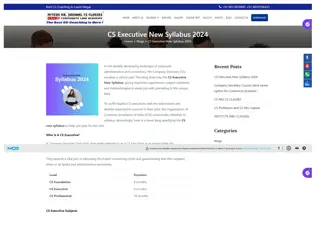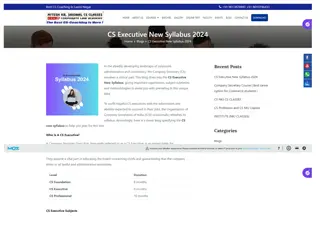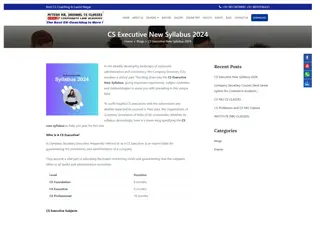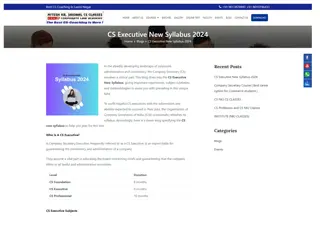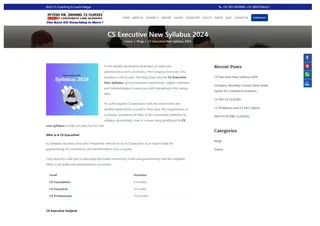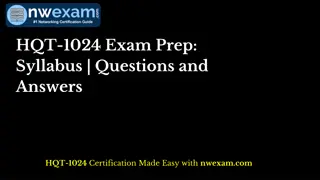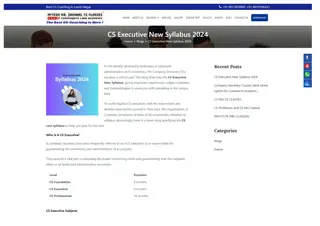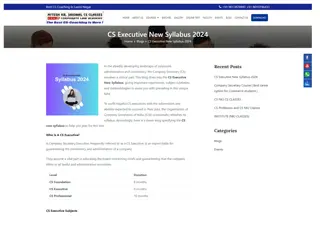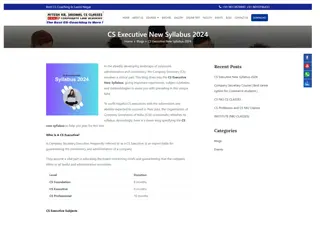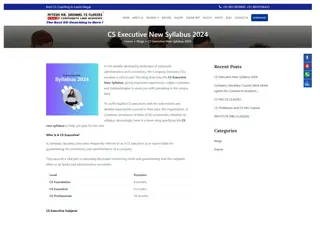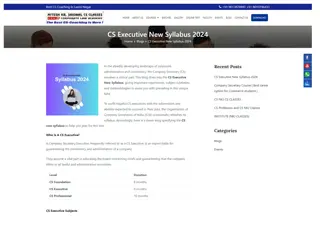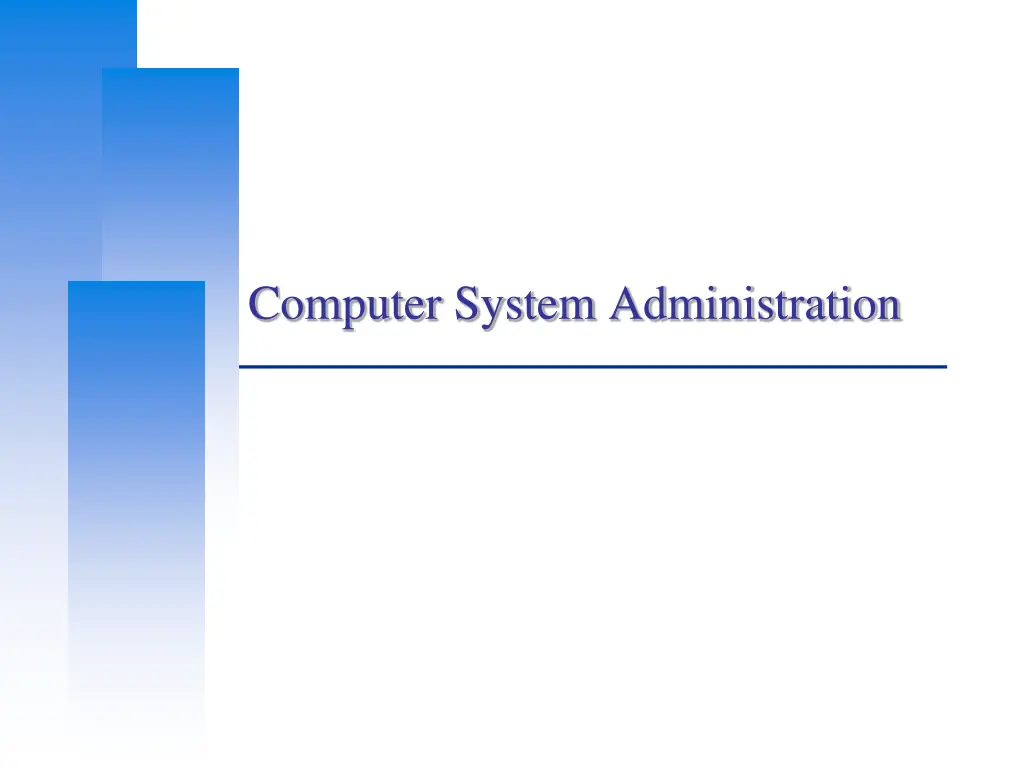
System Administration Best Practices at Computer Center, CS, NCTU
Explore the duties and ethos of a system administrator at Computer Center, CS, NCTU. From technical tasks like system installations and monitoring to non-technical responsibilities like user support, find out what it takes to succeed in this role. Discover the philosophy and flow of change in system administration while gaining insights into the required attitude and learning strategies. Enroll in the course to enhance your skills in system administration and network management.
Download Presentation

Please find below an Image/Link to download the presentation.
The content on the website is provided AS IS for your information and personal use only. It may not be sold, licensed, or shared on other websites without obtaining consent from the author. If you encounter any issues during the download, it is possible that the publisher has removed the file from their server.
You are allowed to download the files provided on this website for personal or commercial use, subject to the condition that they are used lawfully. All files are the property of their respective owners.
The content on the website is provided AS IS for your information and personal use only. It may not be sold, licensed, or shared on other websites without obtaining consent from the author.
E N D
Presentation Transcript
Computer Center, CS, NCTU What System Administrator Should do? (1) Ordinary list Install new system, programs and OS updates Monitoring system and trying to Tune performance Adding and removing users Adding and removing hardware Backup and Restore Configuration management (Ansible, Chef, Puppet, SaltStack, ) Continuous Integration / Continuous Delivery (Git, Jenkins / Travis CI, Sonarqube, ) Log management (Fluentd / Logstash, Elasticsearch, Kibana ) Security Virtualization (KVM, Xen, ) 2
Computer Center, CS, NCTU What System Administrator Should do? (2) Non-technique list Helping users Maintaining documentation Moving furniture Burning your liver Good communication and memorization 3
Computer Center, CS, NCTU What System Administrator Should do? (3) The best words to describe the job Thankless job. http://www.sysadminday.com/ System administration is like keeping the trains on time; no one notices except when they re late. Philosophy of system administration Know how things really work. Plan it before you do it. Make it reversible. Make changes incrementally. Test before you unleash it. 4
Computer Center, CS, NCTU What System Administrator Should do? (4) Flow of Change 5
Computer Center, CS, NCTU What you can learn in this course? The skill to be a candidate of system administrator Information about CS computer center System Admin / Network Admin ? Play with computers What FreeBSD can do. 6
Computer Center, CS, NCTU Attitude Attend every class Do every exercise As early as possible On your own Read book and practice at least 6 hours every week Use unix-like environment Recommend: more than 1.5 hours/day averagely. Collect information on the internet The newer, the better. 7
Computer Center, CS, NCTU Syllabus Website: Instructors: wangth@cs.nctu.edu.tw Time: Thu. IJK (PM 6:30 ~ 9:20) Place: EC122 TAs: We might get about 6 TAs. Email to TAs: ta@nasa.cs.nctu.edu.tw 3GH every week Textbook: Unix and Linux System Administration Handbook (5th Edition) http://www.cs.nctu.edu.tw/~wangth/course/sysadm/ 8
Computer Center, CS, NCTU Syllabus Content We will cover the following chapters in this semester (SysAdm): Chapter 1 ~ 14 Chapter 16, 19, 20 Chapter 27, 31 The following chapters is covered in the next semester (NetAdm): Chapter 15 ~ 18, 21, 23 ~ 25, 30 ~ 32 NAT, DHCP, VPN, Proxy, Python Programming 9
Computer Center, CS, NCTU Syllabus Text book outline Part I. Basic Administration Chap 1 Where to start. Chap 2 Booting and Shutting Down Chap 3 The Filesystem Chap 4 Access control and rootly powers Chap 5 Controlling processes Chap 6 User Management Chap 7 Storage Chap 8 Periodic processes Chap 9 Backups Chap 10 Syslog and log files Chap 11 Software installation and management Chap 12 The Kernel Chap 13 Scripting and the Shell Chap 14 Configuration Management Part II. Networking Chap 15 Physical Networking Chap 16 TCP/IP Chap 17 Routing Chap 18 DNS: Domain Name System Chap 19 NFS: Network File System Chap 20 HTTP: Hypertext Transfer Protocol Chap 21 SMTP: Simple Mail Transfer Protocol Chap 22 Directory Services Chap 23 Electronic Mail Chap 24 Web Applications Chap 25 Network Management and Debugging 10
Computer Center, CS, NCTU Syllabus Text book outline (Cont.) Part III. Operations Chap 26 Continuous Integration and Delivery Chap 27 Security Chap 28 Cloud Computing Chap 29 Containers and Virtualization Chap 30 Monitoring Chap 31 Performance Analysis Chap 32 Policy and Politics 11
Computer Center, CS, NCTU Syllabus Grade Policy Mid 15 ~ 20% Final 15 ~ 20% Exercise (Homeworks) 60 ~ 70% No Delay Work 4 exercises 1 term project 12
Computer Center, CS, NCTU What you should prepare? Background knowledge UNIX commands Basic of TCP/IP Networking (not required) Environment One dedicated PC Or dual OS in your PC. Yourself Your hard study 13
Computer Center, CS, NCTU Finally, Am I OK to take this course? Are you willing to devote yourself to exercise? Yes! Please come Are you newbie in this area? Yes!? It s ok, Please come Do you take more than 3 major courses? Yes!??? It is quite dangerous, but I can not stop u 14
Computer Center, CS, NCTU Login SSH (Secure Shell) PuTTY: https://www.chiark.greenend.org.uk/~sgtatham/putty/latest.html Workstation: https://help.cs.nctu.edu.tw/help/index.php?title= : 16
Computer Center, CS, NCTU Commands Useful commands passwd, chsh, chfn, chpass ls ps, top mkdir/rmdir cp/mv/rm write Email reader: mutt, etc. News reader: tin Connecting: ssh/telnet Manual: man, info, etc. Editor: vim, joe, ee, etc. File Transmittion: ftp, ncftp, lftp, scp, wget, curl, etc. Compilers: gcc, g++, javac, etc. Scripting: perl, php, ruby, python etc. login/exit/logout/screen/tmux 17
Computer Center, CS, NCTU Conventions Syntax of commands: Anything between [ and ] is optional. Anything followed by can be repeated. {a | b} you should choose one of them. Example: bork [-x] { on | off } filename bork on /etc/hosts bork -x off /etc/hosts /etc/passwd bork -x /etc/hosts bork -h /etc/hosts Globing characters * matches zero or more characters. ? match one character. ~ (twiddle) means home directory ~user means home directory of user 18
Computer Center, CS, NCTU man pages (manual) man pages (manual) Contain descriptions of Individual command. % man cp File format. % man rc.local Library routines. % man strcpy 19
Computer Center, CS, NCTU man command Command % man [section] title % man printf % man 3 printf % man -k exit Man pages organization (BSD) (printf command) (C Standard printf func.) (keyword search) %man man AT&T BSD Contents User-Level commands and applications 1 1 System calls and kernel error code 2 2 Library calls 3 3 4 5 Standard file format 5 7 Miscellaneous files and documents 6 6 Games and demonstrations 7 4 Device Drivers and network protocols 1m 8 System administration commands 20 9 9 Obscure kernel specs and interfaces
Computer Center, CS, NCTU HOWTO - Shutdown FreeBSD Shutdown shutdown -p now shutdown -r now (reboot) 21
Computer Center, CS, NCTU Q&A Break time. 22

